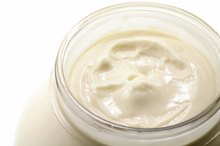Do Microwave Ovens Kill Food Enzymes?
Microwave ovens provide an alternative — and often very convenient — means of cooking or reheating food. Because it's not obvious to many people how it is that they work, however, there are common misconceptions regarding microwaves and their effect on food. For several reasons, microwaves cannot accurately be said to kill food enzymes.
Enzymes
An enzyme is a protein-based molecule that helps chemical reactions take place faster than they otherwise would. Your body relies upon a multitude of enzymes to help it accomplish the chemical reactions of metabolism. You use enzymes to digest your food, enzymes to process food into energy, enzymes to help build structural and functional materials, and enzymes even to help your muscles contract. Your body produces all these enzymes itself, inside the cells.
- An enzyme is a protein-based molecule that helps chemical reactions take place faster than they otherwise would.
- Your body relies upon a multitude of enzymes to help it accomplish the chemical reactions of metabolism.
Enzymes From Food
The Effects of Microwaving on Food
Learn More
It's a common misconception that you need — or in fact can even obtain — enzymes from your food. The fact is that your body produces the enzymes you need itself. While there are some substances, such as vitamins, that you need to run chemical reactions and must get from food, enzymes aren't among these substances. In fact, there's no scientific evidence that enzymes you ingest through the food you eat are taken up at all or utilized by the body — in all likelihood, you simply digest them.
- It's a common misconception that you need — or in fact can even obtain — enzymes from your food.
- In fact, there's no scientific evidence that enzymes you ingest through the food you eat are taken up at all or utilized by the body — in all likelihood, you simply digest them.
Microwave Radiation
Your microwave emits a kind of energy that is often called "radiation," but unlike nuclear radiation or ultraviolet radiation, microwave radiation can't hurt you — it's as harmless as visible light, which is also a kind of radiation.
While high-energy radiation like nuclear radiation can break bonds in molecules, leading to cancer and disease, low-energy radiation can't. Microwave radiation causes molecules to spin, which doesn't damage the molecules, but does produce heat through friction, explains Dr. Martin Silberberg in his book "Chemistry: The Molecular Nature of Matter and Change. 1"
- Your microwave emits a kind of energy that is often called "radiation," but unlike nuclear radiation or ultraviolet radiation, microwave radiation can't hurt you — it's as harmless as visible light, which is also a kind of radiation.
Effect on Enzymes
Disadvantages of Irradiated Food
Learn More
In actuality, enzymes aren't alive, so they can't be "killed" at all, but microwaves do no damage to molecules, explain Drs. Reginald Garrett and Charles Grisham in their book "Biochemistry." As such, even if you did need the enzymes in your food to function — and there's no evidence that you do — microwaving wouldn't affect enzyme integrity 2. Many enzymes become inactive when exposed to heat, but this takes place through conventional cooking, as well.
- In actuality, enzymes aren't alive, so they can't be "killed" at all, but microwaves do no damage to molecules, explain Drs.
Microwaves and Nutrition
Not only do microwaves not damage food through any effect on food enzymes, they may actually minimize damage to other nutrients — such as vitamins — that may be damaged through exposure to heat. A 2007 article published in the scholarly journal "The Journal of Food Quality" notes that conventional cooking reduces the vitamin content of food relative to microwave cooking. Both reduce nutrient content relative to that of a raw food, but this is a natural consequence of heat.
Related Articles
References
- “Chemistry: The Molecular Nature of Matter and Change”; Martin Silberberg, Ph.D.; 2008
- “Biochemistry”; Reginald Garrett, Ph.D. and Charles Grisham, Ph.D.; 2007
- "Journal of Food Quality"; Sensory Attributes and Nutrient Retention in Selected Vegetables; M. Schnepf et al; May 2007
- Siebens J. U.S. Census Bureau. Extended Measures of Well-Being: Living Conditions in the United States: 2011. Updated September 2013.
- Harvard Health Publishing. Microwave cooking and nutrition. Updated February 6, 2019.
- World Health Organization. Electromagnetic fields & public health: Microwave ovens. Updated February 2005.
- Lund D. Effects of Heat Processing on Nutrients. In: Karmas E, Harris RS, eds. Nutritional Evaluation of Food Processing. Dordrecht: Springer; 1988. doi:10.1007/978-94-011-7030-7_12
- American Cancer Society. Radiofrequency (RF) Radiation. Updated June 1, 2020.
- Yang CZ, Yaniger SI, Jordan VC, Klein DJ, Bittner GD. Most Plastic Products Release Estrogenic Chemicals: A Potential Health Problem That Can Be Solved. Environ Health Perspect. 2011;119(7):989‐996. doi:10.1289/ehp.1003220
Writer Bio
Kirstin Hendrickson is a writer, teacher, coach, athlete and author of the textbook "Chemistry In The World." She's been teaching and writing about health, wellness and nutrition for more than 10 years. She has a Bachelor of Science in zoology, a Bachelor of Science in psychology, a Master of Science in chemistry and a doctoral degree in bioorganic chemistry.









